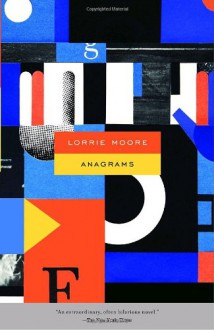Ouch. (Some of them, anyway.)

 The question of what it takes to survie in times of trial is a hard one. The question of what happened then and what happened to are even harder. The hardest, perhaps, is what happens after. This book offers answers to those questions. Set in the Warsaw Ghetto, prior to its uprising and liquidation, the book is part mystery, part deep thought, and all good.In America, while we have our guilt over the second World War (Japanese/Italian/German interment), we also had it easier in the war's aftermath. Not just the question of rebuilding, but we never were conquered and had to deal with the Nazi threat in such a direct and viseral way. France and Poland, for instance, seem to have problems with the question of what happened then. Perhaps some of arises out of guilt, but the issue is still. If you don't believe -what about the Polish response to the movie Defiance? In some ways, Anagrams deals with this as well.The full range and horror of German occupation is in this book, is felt by the reader, not only in regards to the "Final Solution" but in terms of what happened to those who weren't Jewish, just Polish (who were considered sub-human). All types of dangers are present.The central character, Cohen, recieves aid and hinderance thoroughout the novel as he struggles to get to the heart of a series of gruesome murders. The description of life in the ghetto, however, is more horrifiying than the murders themselves, which don't necessary lack power, but whose emotional response lies in the burying of the dead. The setting of the ghetto, the dirt, the closeness, the despair, becomes another character. IN fact all of the settings become characters, for the reader feels the change when the character leaves. There is something different in the tone. It is subtle and that is why it works. It makes the book.That and the book's brutal honesty. For the book is honest, but not judgemental (except in regards to one character). The book allows the reader to reach conclusions about the rightness and the wrongness of the actions, about evil, good, pity, faith, and love. It is such a multi-layered look at such an issue, white, black, grey - all are here.
The question of what it takes to survie in times of trial is a hard one. The question of what happened then and what happened to are even harder. The hardest, perhaps, is what happens after. This book offers answers to those questions. Set in the Warsaw Ghetto, prior to its uprising and liquidation, the book is part mystery, part deep thought, and all good.In America, while we have our guilt over the second World War (Japanese/Italian/German interment), we also had it easier in the war's aftermath. Not just the question of rebuilding, but we never were conquered and had to deal with the Nazi threat in such a direct and viseral way. France and Poland, for instance, seem to have problems with the question of what happened then. Perhaps some of arises out of guilt, but the issue is still. If you don't believe -what about the Polish response to the movie Defiance? In some ways, Anagrams deals with this as well.The full range and horror of German occupation is in this book, is felt by the reader, not only in regards to the "Final Solution" but in terms of what happened to those who weren't Jewish, just Polish (who were considered sub-human). All types of dangers are present.The central character, Cohen, recieves aid and hinderance thoroughout the novel as he struggles to get to the heart of a series of gruesome murders. The description of life in the ghetto, however, is more horrifiying than the murders themselves, which don't necessary lack power, but whose emotional response lies in the burying of the dead. The setting of the ghetto, the dirt, the closeness, the despair, becomes another character. IN fact all of the settings become characters, for the reader feels the change when the character leaves. There is something different in the tone. It is subtle and that is why it works. It makes the book.That and the book's brutal honesty. For the book is honest, but not judgemental (except in regards to one character). The book allows the reader to reach conclusions about the rightness and the wrongness of the actions, about evil, good, pity, faith, and love. It is such a multi-layered look at such an issue, white, black, grey - all are here.
 Thirteen years ago, the dean of my law school gave a speech on our orientation day about how what good lawyers do is to “turn the crystal” on the law – look at it from different angles, bend the light a little differently and see how a whole new world of ideas can open up just by virtue of a different perspective. I often thought of that long-ago lecture while reading this book, as I watched Moore turn the crystal on three people and how their lives intertwine under different sets of circumstances.
Thirteen years ago, the dean of my law school gave a speech on our orientation day about how what good lawyers do is to “turn the crystal” on the law – look at it from different angles, bend the light a little differently and see how a whole new world of ideas can open up just by virtue of a different perspective. I often thought of that long-ago lecture while reading this book, as I watched Moore turn the crystal on three people and how their lives intertwine under different sets of circumstances.